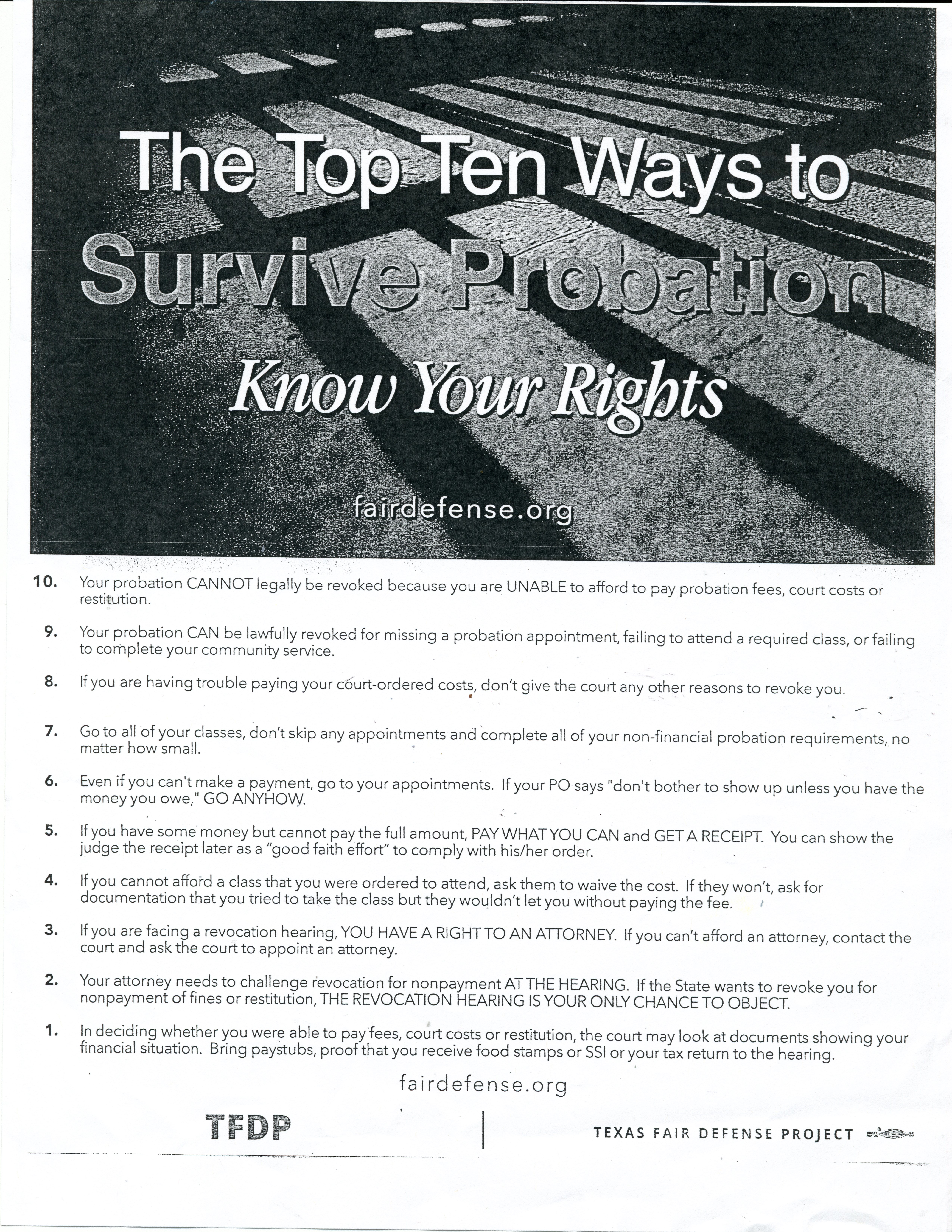Probation_Parole Advice
I'm a criminal defense attorney, and it is my job to advise individuals on how to best navigate through the criminal justice system with as little ease as possible. I would be remiss if I didn’t address what advice I try to impart to those who are about to embark on probation and/or parole. The reality in our profession is being placed on probation (either “straight” probation or via “deferred adjudication”) is a very real possibility, and for purposes of this article, the same advice applies to those who are about to be placed on either.
I usually tell people in almost every other facet of life, the adage “you will never get a 2nd chance to make a first impression” applies – expect when being placed on probation/parole. You don’t want to make a first impression when you first start any form of supervised release (probation or parole). The more of an impact you make up front, it is often the case the harder the overall process will be when working with the probation/parole officer. You don’t want to give them a reason or an excuse to put your file at the top of their very long stack of individuals to supervise. You want to be placed on the bottom of their (very large) stacks of files – and try to remain as close as possible off the radar. To do this – the best piece of advice is to start off in a positive way. Give them nothing to worry about when you first begin.
Here is the advice I have to those who are about to be placed on any type of supervised release, whether probation and/or parole:
- Do not attempt to make a first impression on your first visit. Again, apply the opposite logic to the old adage, “you will never get a 2nd chance to make a first impression” to the most practical extent possible.
- Be professional, nice, and courteous. They have a lot of files and a lot of individuals to oversee. In my experience, the more professional you are to them, the more likely it is they will act with the same professionalism towards you. If you act professionally to them, and conduct yourself in a polite, nice, and courteous manner – they are far more likely to be amenable to scheduling conflicts and other minor details with you down the road
- As quickly as you can (if not immediately), pay off all fines and court costs. Do not give them a petty monetary reason to start chasing and tracking your file. Do not let them make something out of nothing.
- Show up early to all appointments, and be patient if you have to wait. If you show up early, get everything done, and act professionally on the front-end, the more likely they are to make your life easier on the back-end (throughout the period of supervision)
- Try to exercise great and concise communication with them throughout the entire process. If you will have a scheduling conflict with a meeting with them, or you know you will have a job interview, a conflict with work/job, have to be at a wedding or a funeral, have to go be with a sick relative, etc. – simply communicate whatever it is to them and they likely will understand. They are people too, with real problems and outside lives. The worst thing one can do is exercise poor communication with their assigned officer. They don’t know you, your personal life, what is going on behind the scenes, etc. You are merely a case number to them, and they have a job to do. That being said, the Courts want you to be successful if you are allowed to be on supervised release.
- Thus, if you have a conflict with an appointment because of a job interview, communicate this to them so they will know. They likely will not want you to miss out on a good life opportunity just to be sure you make your scheduled, routine appointment with them. However, if you do not communicate with them why you need to reschedule and/or miss an appointment – they will have no way of knowing. They are not mind readers. Often people let communication levels diminish to a minimum – and then when something in life happens and a hiccup occurs – the further distance you will have between you both. So – communicate effectively with them what is going on with your life. Believe it or not, their job is to help you succeed in life (while acknowledging some do not overtly act this way)
- Do not complain to them. Their job is to merely supervise you for whatever period applies to your case in the way instructed to them by the Court/Judge. Often people have negative attitudes about the system, feel irritated by having to be in the “system" they do not agree with, sometimes are frustrated by the requirements and what is expected of them, etc. Regardless, it is important to NOT convey this sentiment AT ALL to your assigned supervision officer. They are simply there to do a job. Most people they supervise complain to them regarding the nature of their relationship (usually being frustrating by certain things one has to do in order to complete it successfully) – do not be one of them. They do not know about the facts of your case, and/or whether or not you got a “fair” deal when you went through the process. Their existence is simply to supervise and ensure you comply with whatever requirements of your supervision are. Period. Don’t be the complainer they always remember from each appointment to the next. Instead, be the nice, polite person they do not mind seeing. The more they don’t mind seeing you – the more likely they are to make your life easier throughout the process (sometimes even let individuals report by phone and/or by e-mail). Just like how every criminal case situation up front and is unique, likewise, every supervision officer is different. They all have different personalities and come from different backgrounds. Sometimes certain personalities clash with others. As such, it is hard to give hard and fast rules for how best to complete probation/parole with the least amount of trouble. That being said, I have found that by trying to follow and adhere to the rules and advice above, you will give yourself the best chance of avoiding potential setbacks along the way.























